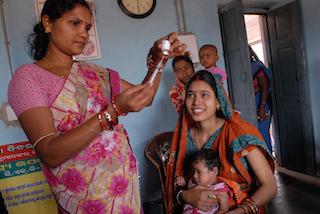
Three community health centers in the Jhansi district of Uttar Pradesh, India initiated “fixed day services” (FDS)—ensuring that quality female sterilization services are available on a designated day every week, all year long. An analysis of total sterilizations across the three facilities in Babina, Gurusarai, and Mauranipur[1] during July 2016 to March 2017 indicates a 29% increase in total number of sterilizations compared to the same period during the previous year.[2] Of the total sterilization procedures performed at these three facilities (n=2,792), half (n=1,395) were conducted on fixed days.[3]
Jhansi district initiated advocacy for the provision of FDS as a result of an Advance Family Planning (AFP) SMART facilitation hosted in September 2015 by AFP local partner Population Foundation of India (PFI). The district working group recognized that access to sterilization services at the sub-district level remained a challenge due to poor implementation of the FDS approach, lack of trained service providers (especially for mini-laparotomy or “mini-lap” procedures), and poor facility preparedness.
The facilities in Babina and Mauranipur were selected because all necessary providers (surgeons, counselors, and nurses) were available onsite. The facility in Gurusarai, despite having no trained service providers posted, was selected due to its close proximity with Mauranipur, where two trained surgeons were available to work at Gurusarai on fixed days.
The Jhansi district working group conducted a rapid needs assessment based on the government’s guidelines to identify gaps and assess facility readiness for initiating FDS services. Following advocacy from the working group, the district health society allocated INR 251,805 (US $3,925) to address existing facilities’ gaps and train health cadres. The national State Innovations in Family Planning Service Agency, trained surgeons on mini-lap for female sterilization services, and the district health society conducted a one-day orientation on family planning counseling for 114 auxiliary nurse midwives and 342 accredited social health activists. Additionally, the health society trained 29 support staff, including staff nurses and operating theater technicians, on pre- and post-operative infection prevention protocols and quality control standards.
While the objective of addressing these gaps was to better prepare facilities to provide services on fixed days, advocacy efforts helped strengthen the overall health system in these facilities. Babina and Mauranipur facilities began offering static sterilization services—meaning that there is a trained provider available to provide quality services every day—in addition to having designated fixed days where clients can receive services. Of the total sterilization procedures performed at these two facilities (n=2,008), 62% (n=1,303) were via static service provision.
The divisional program manager of Jhansi acknowledged the impact of the district working group’s effort to strengthen the health system at the sub-district level and eliminate the sterilization camp approach. He stated, “These are small objectives that will enable us to improve quality of services and move towards our larger goal of population stabilization for the Jhansi district.”
Next, the Jhansi district working group will advocate for training of additional providers to sustain regular and high quality FDS services across the district especially for facilities like Gurusarai where no trained providers are available.
[1] The analysis compared July 2015 – March 2016 (n=2,156) and July 2016 – March 2017 (n=2,792)
[2] Gurusarai and Mauranipur CHCs initiated FDS in July 2016 and Babina CHC in November 2016.
[3] Data as per the facility: Gurusarai – FDS from July 2016 to March 2017, Mauranipur FDS from July 2016 to November 2016, and Babina FDS from November 2016 to December 2016.

